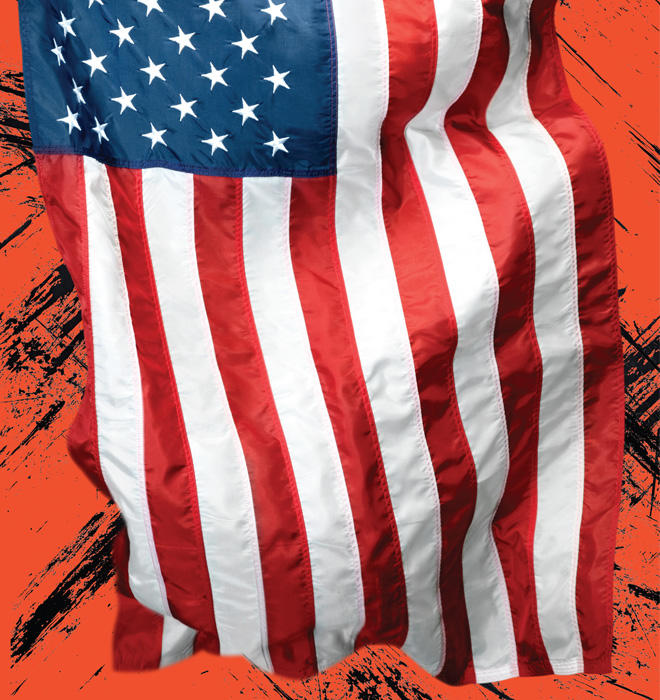
Alumni in the Nation’s Resistance
These 12 Princetonians are among those refusing to let Trump prevail without a fight
Most Americans anticipated that President Donald Trump’s second term wouldn’t be a simple repeat of his first. But few anticipated the speed with which he’d tear into government, or the extent to which he’d challenge laws, norms, and the Constitutional separation of powers.
Still, many have been pushing back against the Trump administration. PAW spoke to a dozen alumni — and one Princeton senior — who are filing lawsuits to block Trump’s orders, mobilizing opposition, or simply trying to lead their communities through these turbulent times. In the pages that follow, these Princetonians describe what they’ve observed and share the strategies they’re following.
To a person, however, they say formal institutions alone won’t prevent the country from tipping into autocracy. “What ended up making a difference during the first Trump administration was [ordinary people] who got involved in local organizing,” says Josh Marshall ’91, the editor in chief of Talking Points Memo.
Kate Huddleston ’11, an attorney with the Campaign Legal Center, says she learned from her undergraduate studies at Princeton that history “is contingent, always changing.
“What happens next is not yet written. It’s up to all of us to decide what direction we want the country to go in.”
The Lawyers
The primary battles against Trump’s policies have taken place in the courts, with civil rights lawyers filing lawsuits on everything from free speech to immigration enforcement to Department of Government Efficiency (DOGE) activities.
The American Civil Liberties Union started drafting playbooks for potential second Trump and Biden terms a couple of years ago, says Emerson Sykes *11, a senior staff attorney in the group’s speech, privacy, and technology practice. Still, the pace and volume of the first months was unprecedented. “In the last two weeks, my team has filed five new cases, which is extraordinary for us,” Sykes said in mid-March.
The administration’s attacks on speech have been numerous, from canceling federal grants that use words related to diversity, equity, and inclusion, to threatening to deport legal residents and naturalized citizens for their political views and pressuring universities and corporations to end DEI programs.
“This is not the first administration that’s tried to regulate speech based on viewpoint,” Sykes says. “But the brazenness … .
They’re not hiding it behind some other justification. They’re making it very clear that they’re cracking down on people because they don’t like what they’re saying.”
As an ACLU immigration lawyer, Maribel Hernández Rivera *10 has been inundated with questions. “Family members call me and say, ‘We heard ICE [U.S. Immigration and Customs Enforcement] is in the subway. What do we do?’” she says. “Mothers in Venezuela reach out to me saying, ‘I just saw my son is in Guantanamo.’ … They’re desperate.”
Sarah Xiyi Chen ’13, an attorney with the Texas Civil Rights Project, has long anticipated the new policies. “What we’ve experienced in Texas has been a lot of what Trump is starting to do at the federal level: the criminalization of immigrants, the crackdown on the border, the attorney general using state resources to target immigration and voting nonprofits,” she says.
Chen works on voting rights and says she’s watched Texas use investigations into alleged ballot harvesting or election fraud to intimidate civil rights organizations. “Demanding documents or other ways of getting inside a nonprofit makes it more difficult for them to operate,” she says. “It also scares other nonprofits from doing similar work.”
While many planned for immigration crackdowns and the Heritage Foundation’s Project 2025 agenda, Elon Musk’s DOGE initiative took them by surprise. Numerous organizations, including the Campaign Legal Center where Huddleston
is an attorney, have filed suit to stop the group from gutting the federal government.
“Government is not the private sector,” says Huddleston. The center has sued DOGE on the grounds that federal statutes don’t permit “seizing power over large swaths of federal spending, dismantling federal agencies, [and] reducing the federal workforce dramatically” by someone who’s not Senate-confirmed, she says, and by an organization “that does not have any powers from Congress.”
In addition to filing lawsuits, the ACLU is also ramping up its storytelling to awaken the general population to the erosion of civil rights. “Not everybody needs to be on the front lines with federal officials, but there’s so much we can do to support each other and make sure that the folks in our communities who are most under attack know we have their backs,” Sykes says. “Even dropping a note to friends who might be struggling — these very small things are not going to necessarily change the world, but they can help in concrete ways.”
Chen says Trump’s actions have revealed how much of American democracy rests purely on norms. “We need to rebuild those norms of respect and trust,” she says. Ordinary people need to start “doing the uncomfortable thing of talking to random people in their communities, face to face, and building the kinds of connections that can actually lead to trust and then to power.”
The Representatives
Before his confirmation hearings to lead the Office of Management and Budget, Project 2025 architect Russell Vought met with senators on Capitol Hill, including Jeff Merkley *82, a Democrat from Oregon, who says Vought anticipated lawsuits would challenge the president’s agenda, but didn’t seem bothered.
“He told me … his goal is to send it to the Supreme Court in the conviction that the court is prepared to hand the executive [branch] far more power than anyone could have ever envisioned,” Merkley says.
That confidence derived from the court’s ruling in Trump v. United States last year that presidential acts are immune from prosecution, Merkley says. “They found invisible ink in the Constitution, totally contrary to the philosophy of the founders, that said the president is more a king than the leader of the executive branch.”
Merkley was among the first in Congress to begin speaking in stark terms, telling CNN in March before the Senate voted on the six-month budget extension, “The best time to take on a tyrant is as early as possible.”
“Folks will say, ‘We can’t push back now, because we fear the power they have,’” says Merkley, who as a member of the Senate Foreign Relations Committee watched democracies collapse around the world. “But when [the] next moment comes, the executive has even more power, and people are even more reluctant.”
At the town halls Merkley holds in Oregon’s 36 counties every year, residents have started asking what they can do. He’s told them to keep talking to their representatives and to join local groups. “It’s tempting to curl up in a fetal position and hope all of this bad news just goes away,” Merkley says. “If people do not respond, then Trump will be empowered to continue this rampage against our republic, and we’ll be forever damaged.”
As a representative from the Chicago area, Democrat Raja Krishnamoorthi ’95 says this, his fifth term in Congress, is “the most turbulent” ever. “My constituents feel a mixture of fear, anger, concern,” he says. “Some people who are supporters of the president are happy with what they see, but even a lot of them are concerned about the unpredictability of certain issues.”
The tension with Canada, one of Illinois’ biggest trading partners, has local businesses worried about their long-term future, and anticipating cuts to Medicaid has left others anxious about paying for health care.
In the short term, Krishnamoorthi says Democrats need to work on awakening their counterparts to how unpopular their policies are. “We need to flip some Republicans,” he says. For the rest, “we need to hold them accountable at the polls.”
But in the longer term, Krishnamoorthi says there needs to be a reckoning with the reality that many voters have lost so much faith in government that they’re willing to “roll the dice” on someone new. “It could be a populist today,” he says. “It could be a demagogue tomorrow.”
Middle-class Americans have long struggled to buy homes, secure affordable health care, and educate their children. “If we can get to the point where government really makes a positive difference in everyone’s lives, and they feel it,” Krishnamoorthi says, “I think, in the future, we’ll be able to resist these attempts to erode our institutions.”
The Attorney General
Democratic attorneys general have been collaborating to jointly file a series of lawsuits against the president’s executive orders, including those revoking birthright citizenship, cutting National Institutes of Health funding, and shuttering federal agencies — as well as DOGE’s handling of citizens’ private information.
Andrea Campbell ’04, the first Black woman to hold statewide office in Massachusetts, helped lead the charge, prompting the Boston Herald to call her “one of Donald Trump’s most dogged foes.”
“I didn’t come into 2025 looking to fight a federal administration,” says Campbell. “I would have preferred to have an administration willing to work with us on the challenges facing our residents.”
So far, she’s been encouraged by the speed with which courts are responding. “I’m seeing judges, appointed by both Democratic and Republican presidents, who are thoughtful and who are pushing this administration not only to follow the law, but to follow the orders that they produce.”
The changes at the top will ripple down to all Americans, she says. “At some point they may feel it in their utility bills, or if they’re trying to get their child in a pediatric cancer trial that they’re unable to access, or if they’re trying to ensure there’s adequate numbers of teachers in their school district.”
Campbell says voters need to get to know their attorneys general, including in red states. “We can’t do it by ourselves,” she says. “We need a public and an electorate that is paying attention.”
The Council President
A series of ice raids in Newark in late January reverberated 35 miles away in Jamesburg, New Jersey, where Princeton senior Thomas Emens ’25 is president of the borough council. “We’ve seen people hesitant to go out or even go to work,” he says.
Emens’ hometown doesn’t track how many of its 6,000 residents are undocumented, but about 35% are Latino. “I grew up with classmates whose parents immigrated from Mexico, Central America, and South America,” Emens says. “When one portion of our residents is singled out, it affects everybody.”
Emens traces his Jamesburg roots to the 1860s. In high school, he led a revitalization project at the local library after joining its board of trustees. Over time, he became concerned about how the borough was being managed. “Instead of complaining, I felt I should put some of the skills I had learned to the test and help the people who have made a huge difference in my life,” he says.
Emens, a politics major and former summer intern with Princeton’s Scholars in the Nation’s Service Initiative, was elected to the borough council in 2022 and became its president last year. He says federal funding cuts will be felt directly in small communities. The borough had been counting on federal money for infrastructure improvements to combat flooding and relocate the police department. But now it might have to turn to the state, along with every other strapped community in New Jersey.
“We don’t have wealthy [political] donors, and we don’t have a large voting base, so it’s already very difficult for us to try to get our needs heard at higher levels,” Emens says.
The cuts to federal personnel will also ripple outward. “It’s going to be very difficult for our communities to navigate [loan and grant] applications without there being a sufficient workforce to accommodate it,” Emens says. “When we start to see the real-world effects, people will learn very quickly just how important the federal government really is.”
The President of Planned Parenthood
Cuts to medicaid, the removal of public health information from government websites, and even immigration policies are all affecting Planned Parenthood’s ability to deliver care to the 2 million people who seek it annually. “Fifty percent of Planned Parenthood patients are Medicaid patients,” says Alexis McGill Johnson ’93, who’s led the organization since 2019.
Planned Parenthood’s 600 clinics have been flooded with calls from people looking for information about what services are permitted in their states, how to travel to other states, and whether they’re even permitted to make those trips. “One of the strategies of this administration has been to sow a lot of chaos and confusion and misinformation,” McGill Johnson says.
Abortion only constitutes about 4% of Planned Parenthood’s services. The rest deal with health screenings, contraception, and STDs. Still, Planned Parenthood is looking to build out more virtual care options, not the least because Trump pardoned 23 people who’d been convicted of blocking clinics, along with some of the rioters from the Jan. 6 attack on the Capitol who McGill Johnson says are known abortion clinic protesters.
“There’s an increased sense of fear for patients and the staff, watching them have to navigate their safety without the kind of legal mechanisms to hold people accountable,” she says.
As her own daughter heads to college, McGill Johnson says she finds it sobering that Project 2025 is trying to “take back the progress that women and people of color have made over the last 60 years.”
“Our generation was the first to be the direct beneficiaries of the feminist and civil rights movements,” says McGill Johnson, who was born in 1972. “And now, depending on where she goes, she’s going to have less rights than I did when I was at school some 30 years ago.”
Still, there are signs of hope. “Just in this last week, I’ve been in big rooms, big rallies, small rooms, small dinners, schools, universities, and public and private institutions with an incredibly powerful, multigenerational, diverse leadership of women who are just quietly putting the pieces together to fight back.”
The Organizer
In December, the progressive organization Indivisible had 1,000 local groups. When this article went to press, it had about 1,700. By the time you read this, there could be hundreds more. “We’re seeing an absolute wave of grassroots energy,” says Ezra Levin *13, who co-founded Indivisible after the 2016 election.
With chapter memberships ranging from just a handful of people to thousands, the locally led groups organize rallies, meetings in person and online, and phone banks. “They’re started by a couple of friends, or a book club, or a community group,” Levin says, adding that frustration with Democratic leadership at the national level is fueling some of the growth.
Local action is essential, says Levin, a former congressional staffer who received a master’s in public affairs from Princeton’s School of Public and International Affairs. “You can look around the world, and you can look for historical examples, and I don’t know an answer to creeping authoritarianism that does not rely on normal, everyday citizens organizing together.”
That’s the goal for now: build “a broad-based, cross-ideological, pro-democracy movement,” Levin says — one which will involve Trump voters as well, people who “didn’t think they were going to get the Department of Education gutted or USAID gutted, or a fundamental attack on their freedoms.”
The fact that the administration is using intimidation tactics is, counterintuitively perhaps, encouraging to Levin. “It comes from a sense of weakness. They know what they’re doing is unpopular, [and] that if the people organize against it, [the administration] might be stopped.”
Levin has been making the rounds on news shows and doing interviews with podcasters and Substack writers, as well as holding weekly online discussions and Q&As with Indivisible members. “The only real sense of security you can have in this kind of environment is strength in numbers,” he says. “The more people who take that courageous step forward, [the more they’re] seen by dozens or hundreds or thousands of other people, who then decide to take a step forward as well.”
The Strategist
Around the end of Trump’s first term, Barton Gellman ’82 wrote a series of articles for The Atlantic about how difficult it would be for U.S. institutions to restrain an authoritarian president. Shortly afterward, the Pulitzer Prize winner, who spent most of his career at The Washington Post, decided to leave journalism, at least temporarily, to join NYU’s Brennan Center for Justice and war-game how the country could withstand a determined power grab.
“I found myself repeatedly writing that we were at a hinge in history, and that the dangers were very real,” says Gellman. “I felt more and more as though I were pointing a finger and saying, ‘It looks really bad out there,’ instead of seeing how I could pitch in more directly.”
Among the Brennan Center’s many projects is an effort to oppose proposed voter registration requirements that the center says are so restrictive they’d effectively disenfranchise tens of millions of Americans.
It’s also reaching out to Republicans to persuade them that many of the things Trump is doing are not what they voted for.
“We know from polling that many of them are surprised by and distressed about what’s happening,” Gellman says.
He’s also run a series of tabletop exercises with retired legislators, judges, military officers, business executives, union leaders, and heads of civil rights organizations to identify tools that could be used to restrain abuses from the executive branch.
“It was a little daunting,” Gellman says. “When you have a president who controls all three branches of government and is prepared to break the law and violate long-standing norms, there’s not tons of hard leverage that can be used to slow him down.”
Still, the president, Congress, and the courts can all be influenced by grassroots efforts, Gellman says, like protests, boycotts, strikes, and local political organizing. “What Trump can get away with … is going to depend on what the American people collectively allow,” he says. “Trump, like every politician, cares about these things.”
Gellman also warns that one shouldn’t assume Trump and his supporters will consider anything out of bounds, including trying to secure a third term or attempting to skew upcoming elections. “Things are happening today that, when they were predicted during the campaign, people on the Right said, ‘Trump would never do that.’ And he is doing that.”
E.B. Boyd ’89 writes about business for Fast Company and is working on a book about women entrepreneurs.



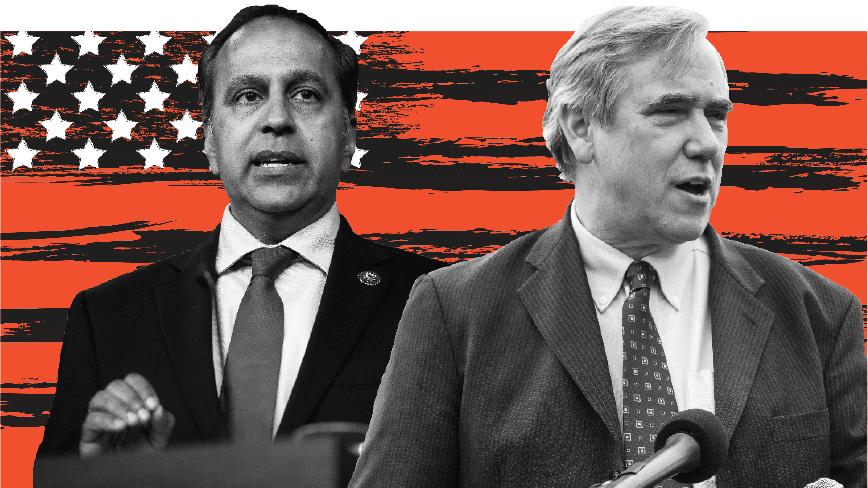

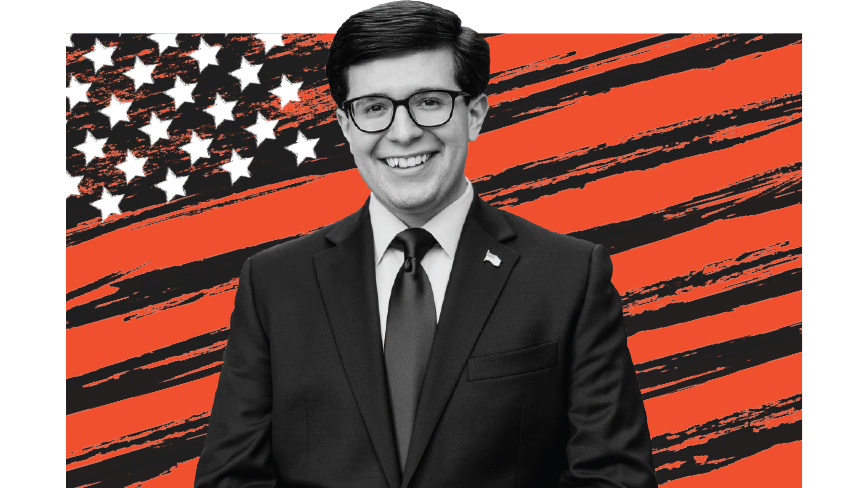

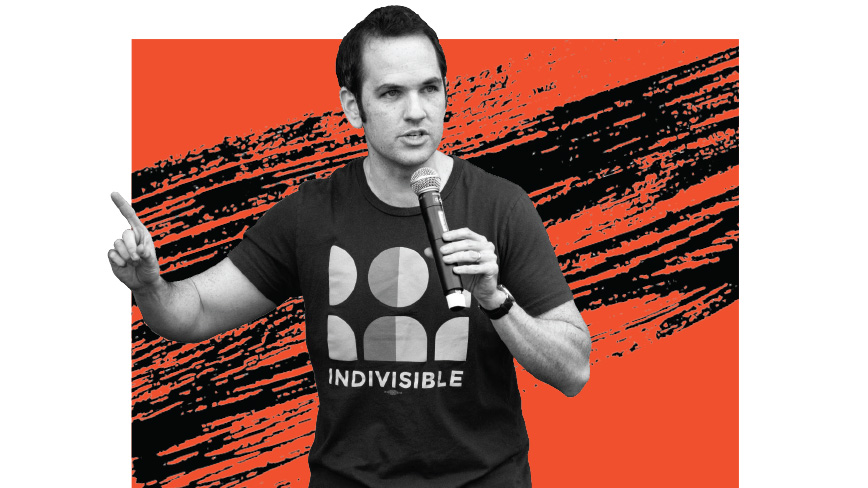
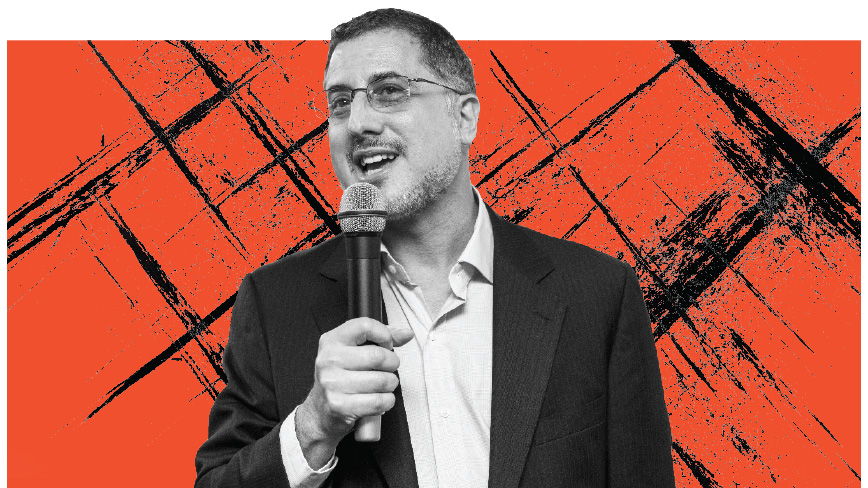




14 Responses
John M. Chludzinski ’85
4 Months AgoCover Alumni in the Trump Administration
PAW editors: When can we expect a similarly glowing analysis of alumni that supported Trump’s successful policies in the Middle East? Were any alumni involved in the worthy efforts to stop Iran’s reckless nuclear ambitions, bring Qatar’s duplicitous support of the terrorist organization Hamas to an end, bring about a ceasefire between Hamas and Israel that returned the hostages and ended a two-year war that Hamas started, and enabled many tons of humanitarian food aid to reach the starving residents of Gaza at long last? I cannot wait to read about that in PAW (sarcasm added). Maybe a spotlight on Pete Hegseth, perchance?
Anibal Diaz ’76
5 Months AgoUpholding Traditional Conservative Values
I find it fascinating to observe how institutions that once upheld traditional conservative values — such as faith, family, and patriotism — are now aligning with liberal agendas that often seem to promote confusion and disorder. The May 2025 issue of PAW, featuring the section “Alumni in the Nation’s Resistance,” offers clear evidence of this shift. Out of thousands of alumni, only 12 voices were prominently showcased to represent Princeton — a clear misrepresentation of the majority who do not suffer from Trump Derangement Syndrome.
The article represents larger problems in our country. I stand in opposition to a vocal minority intent on erasing our history, rewriting the narrative of our past, and disregarding the foundational principles that have shaped our success. Many of us support a government that has strengthened borders, earned global recognition and respect, reduced inflation, fostered commerce and industry, and promoted a return to Christian values.
Sadly, however, it appears that certain influential figures within prestigious universities are driving an agenda that distorts truth, embraces radical and socialist ideologies, and threatens the core fabric of our nation. These efforts include sowing confusion among younger generations about fundamental distinctions, such as those between men and women, and spreading misinformation while opposing anything connected to Trump, regardless of its merits.
I sincerely hope that Princeton demonstrates the wisdom inherited from the great minds of the past and invites a similar group of alumni to showcase the progress enabled by our current government and the promise it holds for continued success.
Frank Hurley *65
8 Months AgoFriendly Advice
First, full disclosure. This Princeton graduate alumnus is a right-wing Republican and has never been anything else. In fact, my first direct campaign activity was ringing doorbells for Barry Goldwater, in Princeton, in 1964.
The hubris of the Princeton Alumni Weekly is stunning. In view of all that has come down during 2020-24, it was obvious to the village idiot that if The Donald were to succeed of election in 2024, he and his new administration would really be out to settle some political scores. Why then were the editors of PAW so clueless as to publish a May 2025 issue which images the University as a wholly owned subsidiary of the Democratic National Committee? “Climate warnings ... African American studies ... commitment to DEI remains unwavering ... Sotomayor ... advocate for Palestinians ... belonging score ... clean energy ... incarcerated readers ... Pinochet’s military dictatorship ... [and the piece de resistance] Alumni in the Nation’s Resistance.” With such a PAW issue, how can the University argue that, at the end of the day, “Princeton in the Nation’s Service” will work with any president to deliver the best graduates and the best research to America, eschewing political distractions?
Clark Irwin *78
9 Months AgoPolemical Posturing
Unless I have been culture-canceled and not yet notified, I believe I am part of this nation, so PAW’s waving the “nation’s resistance” banner over a disgruntled dozen strikes me — while granting that Mr. Trump is a flawed vessel for holding the spirit of a constitutional republic — as a bit of polemical posturing. But if the article is to be part of a series, I look forward to a forthcoming installment highlighting Princetonians who toiled among the resistance to the late Biden administration’s gleeful disregard of immigration law, strident embrace of authoritarian measures under color of COVID precautionism, boastful refusal to observe judicial rulings that it lacked authority to “cancel” student debt, incompetent termination of the country’s Afghanistan adventure, last-minute abuse of the pardon power to shield family members and hangers-on from prosecutions, and turning federal law-enforcement agencies into a weapon of partisan politics. Does Princeton aspire to become another Columbia-style citadel of woke sensibilities?
Allan Demaree ’58
9 Months AgoOne-Sided Commentary
While PAW has long sung from the lefty hymnal, “Alumni in the Nation’s Resistance” (May issue) summons forth the whole brass band. “Tyrant,” “intimidation tactics,” “attacks on free speech,” and “rampage against our republic” are but a few of many slurs that go unchallenged in this paean to President Trump’s opponents. You would think his adversaries were résistants in occupied France rather than foes of a democratically elected government. If I want this kind of one-sided commentary, I can read The New Yorker, listen to NPR, or watch CNN and MSNBC. I don’t need it from my alumni magazine.
Rocky Semmes ’79
7 Months AgoUncertainty Raised by Russian Interference
Yevgeny Prigozhin, a once influential Russian figure, is on record for declaring in 2022 that “we have interfered [in U.S. elections], we are interfering, and we will continue to interfere.” The founder of Russia’s mercenary Wagner Group, he was linked to the Internet Research Agency, described as a “troll factory” of Russian influence operations. It might only be coincidence, but Mike Flynn, serving as national security adviser during the current administration’s first term, was forced to resign for lying about his contact with Russian operatives.
It might also be only coincidence that the Oval Office in 2017 hosted two major Russian dignitaries (Foreign Minister Sergey Lavrov and Ambassador Sergey Kislyak) the day after the firing of James Comey, director of the FBI. The meeting (from which U.S. media were barred) was only confirmed by photos from Russian government agencies. Mr. Comey had been overseeing an investigation into Russian meddling in the U.S. elections, and possible ties between the Republican campaign and Russia.
Allan Demaree ’58, writing a self-righteously riled and resentful response to “Alumni in the Nation’s Resistance” (May issue), takes issue with that article and with PAW itself. He describes those critical of the current administration as “... foes of a democratically elected government.” PAW, to its credit, published letters pro and con toward “Alumni in the Nation’s Resistance.”
Socrates described wisdom as knowing what you don’t know. Regarding the issue of the current government being perfectly and purely “democratically elected,” well, perhaps there the jury is still out. The jury is unimpeachably in (so to speak) and has rendered a verdict, but only in regard to the Oval Office issues of sexual offense and 34 felonies. This much we know for certain.
Peter J. Turchi ’67 *70
9 Months AgoPAW Should Resist ‘Resistance’
The May 2025 PAW issue seemed designed to outrage a portion of Princeton alumni. Apart from the instigation of traditional alarm at architectural atrocities, whereby each generation of Princetonians bemoans the desecration of their version of a beloved campus, a more important issue is the repeated display of political bias by unnecessarily adopting the vocabulary and intentions of the Democratic Party, using its words of “resistance” to the current administration and calling on actions aligned to Democratic Party politics. While such exhortations are fine for individuals, their appearance in a semi-official publication of Princeton University can have real consequences by providing a basis for others to challenge Princeton’s tax-exempt status as a 501(c)(3) organization. This is a complicated concern, expressed for Harvard in a recent Wall Street Journal opinion piece by Ira Stoll (May 5, 2025, p. A17). I urge PAW to be cautious in inadvertently harming Princeton while indulging in feel-good journalism verging on Trump Derangement Syndrome. During these difficult times for higher education, we appreciated better, elsewhere in the same PAW issue, the clear-eyed and balanced language of President Eisgruber.
James Mathewson ’81
9 Months AgoWhat About Alumni Who Support Trump’s Agenda?
When can we expect to see an article featuring alumni who support the Trump administration’s agenda? I realize President Eisgruber only communicates via far-left media, but I would like to believe PAW recognizes an obligation to reach across a wide spectrum of its readership. Each topic presented by Ms. Boyd has important counterarguments. For example, consider the “threat to free speech” against colleges.
A “private” university should not depend on federal tax/debt revenue to fund almost one-fifth of its operating expenses. It’s unacceptable for federal funds to be explicitly or implicitly tethered to support of any nonacademic cause or activity — liberal, conservative or otherwise. Long term trends which have driven colleges overwhelmingly to the left must be reversed to achieve a noninterventionist balance. That means cutting federal funding. That means eliminating pointless, nonproductive overhead positions and “research projects” that run for years without output of any value. Maybe it means ultra wealthy institutions paying their “fair share” of taxes. A multitude of dramatic changes to academia are overdue and welcomed by a majority of Americans. “Free speech” is not, in my view, at risk.
Princeton alumni should welcome an informed debate and balanced journalism on all topics. But I suppose it’s easier and maybe just safer to stick to one-sided portrayals of political advocates such as the story by Ms. Boyd.
Lucia Scalamandre ’26
9 Months AgoInspired by Those Who Are Fighting Back
I am coming up on the completion of my junior year at Princeton University, and I have never been more proud to be a Tiger! Thank you to all those who are fighting back — you are inspiring the entire community to get involved in any way we can. The students are standing up with you.
Bruce Gilley *07
9 Months AgoDisgusted by My Alma Mater
Why was there no article on the Princetonians in “the nation’s resistance” to the lawless and illiberal Biden regime? Trump won the most votes, so how is this partisan antidemocratic, January 6th-style “resistance” representative of “the nation”? Disgusted by my alma mater and its antidemocratic turn.
Laurence C. Day ’55
9 Months AgoTrump Administration Deserves Scrutiny
Bruce Gilley *07 calls the Biden administration illiberal or some such stupid nonsense. The Republicans voted for the worst candidate in the history of all elections. Trump is not only the dumbest to “lead” us, but mean as a viper snake, a narcissistic goon, tears down the federal government, has no respect for the Constitution or the rule of law, and is a convicted criminal. He uses tariffs that are merely the mirror of taxes on all of us by increased end product prices. So why should PAW say anything about this idiot other than laying out facts when he speaks or gives an executive order?
Bruce Gilley *07
9 Months AgoWell Said
Mr. Day’s testimony is as eloquent a statement of my point as is possible to imagine.
Giuseppe Caire *92
9 Months AgoFight On
I am a Princeton alumnus, now professor of electrical engineering at Technical University of Berlin, Germany, a member of the German National Academy of Science and recipient of the Leibniz Prize, the highest scientific honor in Germany. I am all for resisting and fighting back the indecent and senseless aggression of the Trump administration against higher education and research universities in particular. Go and fight on!
Richard M. Waugaman ’70
9 Months AgoInspiring Princetonians
What a fantastic, inspiring article! Along with President Eisgruber’s courageous defense of academic freedom from Trump’s bullying, it makes me even prouder to be a Princeton alum.